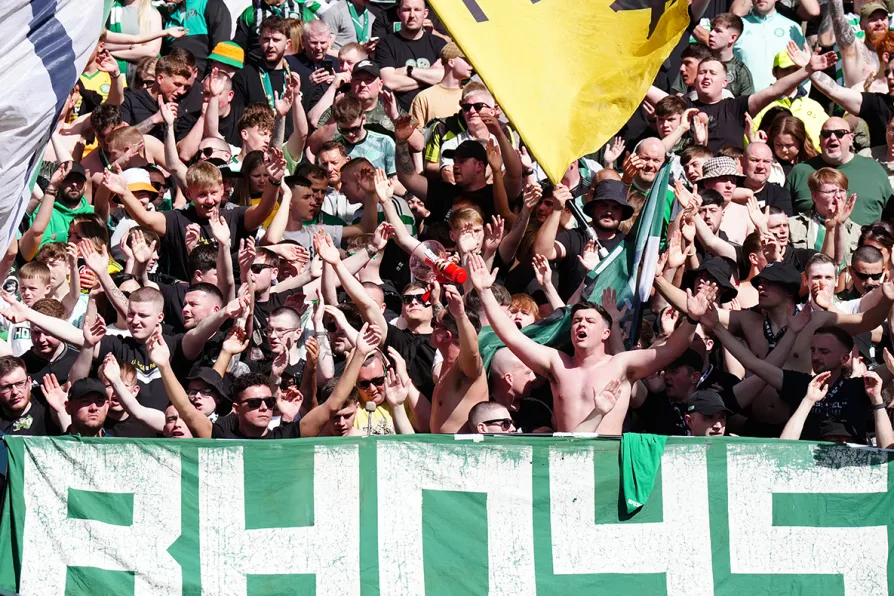Does widespread and uncontrolled use of AI change our relationship with scientific meaning? Or with each other? ask ROX MIDDLETON, LIAM SHAW and MIRIAM GAUNTLETT
Fans have beaten repressive, stigmatising legal attacks on themselves before, but now a new wave of repression is building Scottish trades councils are looking to organise new community resistance, reports SEAN O’NEILL


THIS week marks seven years since the repeal of the Offensive Behaviour at Football and Threatening Communications Act 2012 (OBFA), a reactionary SNP government legislation designed to criminalise Scottish football supporters.
Under the smokescreen of tackling sectarianism — for which laws already existed — the hated Act empowered police to intimidate, harass, detain and arrest any fan they decided was displaying “offensive behaviour.” In applying only to the football supporter and no other group in society, it was inherently discriminatory.
The OBFA ruined lives. Constant surveillance in and around stadiums, mostly of young men from working-class areas, was compounded by dawn raids and criminal charges, which caused job insecurity, broken families and relationships.
Its repeal in 2018 came after years of extra-parliamentary action, creative messaging in the stands and the streets. Grassroots campaigning to “kill the Bill” was spearheaded by Fans Against Criminalisation, an alliance of Celtic supporters which broadened to those of clubs across Scotland, including Rangers.
The movement demonstrated that when thrown into collective struggle, united by common injustice and a shared strategy, ordinary working-class people have the power to make serious political change.
The government fiercely resisted the repeal, police chiefs mourned the loss of powers and staunchly campaigned for more. The law might have changed, but the authoritarian streak in the Scottish political class and the repressive instinct of Police Scotland have not gone away, nor has a deeply ingrained bias against football fans.
The need for a supporter’ movement has not gone away either. Repression has been gradually creeping back in. The recent introduction of additional Section 60 (Criminal Justice and Public Order Act 1994) stop-and-search powers on matchdays has rubber-stamped it.
The kettling of a large group of supporters before the Celtic v Rangers match on March 16 was reminiscent of the unprovoked riot control tactics that sparked mass public outrage over the treatment of supporters at the height of the OBFA. The further denial of privacy to females for full body searches has wider reverberations in the context of institutional misogyny and violence against women and girls.
The Green Brigade statement following the kettling incident contextualised it as an attack on all Scottish football supporters and all who value civil liberties. A wave of statements from ultras groups across the country has struck a similar tone.
It should be obvious to any trade unionist that these issues have serious implications for our movement. The historical development of policing in Scotland can only be understood in the context of the growth of industrial capitalism and the need to contain an increasingly organised and militant working class.
From the Glasgow Police Act 1800 onwards, this repressive class function developed through endless legislation which modernised policing as a means of combating workers’ militancy, particularly during the peak years of Chartism.
During the general strike of 1926, officers would chalk mark the back of a striker’s coat so that he could be arrested at a later date. Nowadays, cops record the faces of deemed offenders for the same purpose — whether football supporters or organised protesters.
There is a tendency among left intellectuals to dismiss football as a distraction that dumbs down the worker, dilutes consciousness and derails unity. The campaign against the OBFA showed that the total opposite can be true.
What we need now is a sustained supporters’ struggle that tackles poor policing alongside a broad spectrum of class issues facing supporters. The game as a business is based on the financial exploitation of working people and our families.
Obscene amounts of our hard-earned wages are spent on tickets, on subscriptions to two or three profiteering companies that televise games. On replica kits which proliferate in number every season, displaying the betting companies that breed misery in our communities, worn by the stars our children idolise.
The interview with Trade Union Blues secretary Chris Nalton in the Morning Star last week perfectly captures the battle for football’s soul and the need for us to draw upon trade union values to defeat the global monopoly capitalist takeover of our game.
There is a growing appetite for proper fan engagement channels that give ordinary punters a say in the running of football, for redistributing wealth to the grassroots and the communities that give clubs their identity.
Trades councils, as the link between the workplace and the community, are uniquely placed to develop the necessary alliances between like-minded trade unionists and supporters’ groups.
On Friday May 9 from 7pm in Hampden Bowling Club, the birthplace of international football, the Glasgow Trades Council will host a public meeting tackling these issues.
Too often, football fans are portrayed as out of control — occasionally, we can be. But the bigger picture is the market forces, the powers that run and police football, are out of control. It’s time to reclaim the working people’s game.
Sean O’Neill is a GMB shop steward and member of the Glasgow Trades Council executive committee. You can sign up for all GTUC May Day 2025 events here: linktr.ee/glasgowmayday.

TOM GALLAHUE argues that asking what role Irish diaspora educators can play in shaping Irish unity is to ask a deeper question about democracy itself

A new group within the NEU is preparing the labour movement for a conversation on Irish unity by arguing that true liberation must be rooted in working-class solidarity and anti-sectarianism, writes ROBERT POOLE

A new front in the fight for football’s soul is emerging — one rooted in trade union values and collective power










